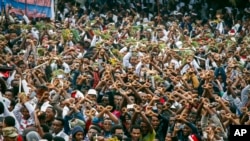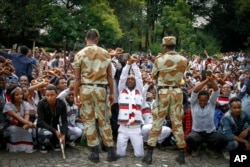Ethiopia’s tourism sector is suffering. The impact of a year of violent protests and state of emergency has led to a decline in tourists visiting the country. Ethiopia had been showing signs of becoming a popular new tourism destination in recent years, attracting people not only for its historical sights, but also for its reputation as one of the safest African countries.
Rock churches in the historical town of Lalibela, in northern Ethiopia, attract thousands of tourists each year. But the six-month state of emergency declared three weeks ago by the government to deal with months of protests is scaring away tourists.
Belayneh Mengesha is a Lalibela tour guide who was born and raised in the town. He says October is usually the start of the high season but not this year.
“Unfortunately, because of this problems happening in some parts of the country, some just have already cancelled their trips to Ethiopia,” said Mengesha.
Belayneh also says tourism is a source of income, directly or indirectly, for many citizens of Lalibela. Meaning that any decrease of visitors affects the entire community, even though Lalibela has not been hit by the protests and demonstrations.
Oromo and Amahar demonstrators took to the streets to protest the land disputes with the government.
Bram van Loonsbroek flies air balloons over the Oromia region and had to cancel several flights after the state of emergency was declared. He says customers are concerned about their safety and want to stay away from ares with unrest.
“We don’t have anything to do with potential land discussion. Because we land, we pack the balloon and we are back again," said Loonsbroek. "We do give some landing fee to the farmers. And that’s what we try to do to comfort the passengers to explain simply how we work.”
Ethiopia has seen the number of tourists steadily increase in the last decade. But any development disturbing the reputation of a tourist destination takes a long time to rebuild. The ongoing protests in Ethiopia resulted in clashes with security forces and hundreds of deaths.
Stephen Richer is of Skål International, a global association promoting tourism. He says because it can be so easy for rumors and misinformation to spread, authorities need to be transparent and clearly communicate the situation so visitors can make good decisions.
“So for example, the Ebola was in West Africa and how people stopped going to South Africa, because they didn’t know the facts," said Richer. "So there is a messaging challenge here, which is, start telling people right away what is accurate. Don’t sugarcoat it.”
Several tour operators say they have about 50 percent less business than last year and some actually welcome the state of emergency in the hope that the protests will quickly stop and tourists will return.





